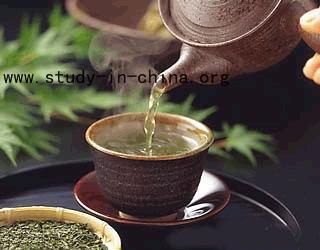more>>More News
- National Day
- ways to integrate into Chinese style life
- Should they be in the same university with me?!!
- Chinese Ping Pang Legend: the Sun Will Never Set
- A Glance of those Funny University Associations
- mahjong----The game of a brand new sexy
- Magpie Festival
- Park Shares Zongzi for Dragon Boat Festival
- Yue Fei —— Great Hero
- Mei Lanfang——Master of Peking Opera
Advantages of Tea-Drinking
By admin on 2015-01-30
Tea has been one of the daily necessities in China
since time immemorial. Countless numbers of people like to have their aftermeal
cup of tea.
In summer or warm climate, tea seems to dispel the heat and
bring on instant cool together with a feeling of relaxation. For this reason,
tea-houses abound in towns and market villages in South China and provide
elderly retirees with the locales to meet and chat over a cup of tea.
Medically, the tea leaf contains a number of chemicals, of which 20-30%
is tannic acid, known for its anti-inflammatory and germicidal properties. It
also contains an alkaloid (5%, mainly caffeine), a stimulant for the nerve
centre and the process of metabolism. Tea with the aromatics in it may help
resolve meat and fat and thus promote digestion. It is, therefore, of special
importance to people who live mainly on meat, like many of the ethnic minorities
in China. A popular proverb among them says, "Rather go without salt for three
days than without tea for a single day."
Tea is also rich in various
vitamins and, for smokers, it helps to discharge nicotine out of the system.
After wining, strong tea may prove to be a sobering pick-me-up.
The
above, however, does not go to say that the stronger the tea, the more
advantages it will yield. Too much tannic acid will affect the secretion of the
gastric juice, irritate the membrane of the stomach and cause indigestion or
constipation. Strong tea taken just before bedtime will give rise to occasional
insomnia. Constant drinking of over-strong tea may induce heart and
blood-pressure disorders in some people, reduce the milk of a breast-feeding
mother, and put a brown colour on the teeth of young people. But it is not
difficult to ward off these undesirable effects: just don't make your tea too
strong.

- Contact Us
-
Tel:
0086-571-88165708
0086-571-88165512E-mail:
admission@cuecc.com
- About Us
- Who We Are What we do Why CUECC How to Apply
- Address
- Study in China TESOL in China
Hangzhou Jiaoyu Science and Technology Co.LTD.
Copyright 2003-2024, All rights reserved




 Chinese
Chinese
 English
English
 Korean
Korean
 Japanese
Japanese
 French
French
 Russian
Russian
 Vietnamese
Vietnamese
